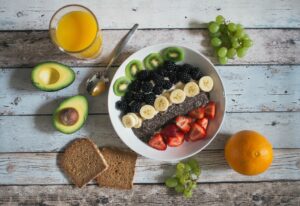
The meals that we eat influence our health. Diet-associated non-communicable diseases, consisting of obesity, kind 2 diabetes, cardiovascular disease, hypertension, stroke, and a few sorts of cancer, were an increasing number of inflicting health troubles in both growing and advanced countries. Policy-makers have been looking to introduce numerous special gear to inspire populations to eat more healthy ingredients and reduce their consumption of dangerous ingredients, via tasks consisting of dietary schooling programs and economic programs, amongst others.
Healthy meal choices are important for a healthful lifestyle. However, meal selections are complex and suffer from diverse elements. Understanding the determinant elements affecting meal selections could be a useful resource for policy-makers in designing better techniques to sell healthful meal choices to the folks. Given the concern for population nutritional change, there’s a want for extra knowledge of the determinants that have an effect on meal choice.
Factors that affect the choice of diet:
Biological Factors
- Hunger
Humans want power and vitamins so as to survive. Their bodies are stimulated by the emotions of hunger. Different macronutrients have exceptional effects on satisfaction. For example, fats are the least satisfactory, then carbohydrates than protein. In addition, low energy density diets have more satisfaction y than excessive energy density diets.
2. Taste
Palatability increases when the person seems to be satisfied by the consumed meal. The taste, smell, texture and look of a meal all affect on the palatability of a meal. For example, candy meals have an excessive sensory attraction and have better palatability which means that the meals can be consumed for satisfaction rather than as a supply of energy and vitamins. It is suggested that the better the palatability of a meal, the better the intake.
Economic Factors
- Cost
How much is the meal and if the person’s income allows him to afford it has a lot of impact on the diet choices? Families with low income eat very unbalanced foods and do not focus much on the regular intake of fruits and vegetables. And on the other hand, having a lot of income also doesn’t indicate the consumption of a balanced diet.
Physical Factors
- Access and availability
Accessibility to stores and the supply of meals inside stores affect meal choice. This is related to delivery hyperlinks and geographical locations. For example, ‘food deserts’ are regions of resistance with few or no shopping facilities. Improving access does now no longer always suggest that people will alternate their meals choice.
2. Education
Individuals who can be knowledgeable and informed about ‘wholesome consuming’ are much more likely to choose wholesome nutritional alternatives. This, however, relies upon whether or not the person is capable of practising their understanding.
3. Time restraints
Time constraints will save you, people, from adopting wholesome alternatives specifically the younger people that stay on their own and select comfort meals. The demand has been met with the advent of extra ready-to-prepare dinner food and pre-packed fruits and vegetables. Although the easy meals are extra expensive, clients are inclined to pay for them.
Social Factors
- Social Status
There are variations in meal choices in specific social statuses which cause both under- and over-nutrition. For example, humans within the better social status families generally tend to have more healthy diets. It is a concept that better socioeconomic families have more healthy diets due to the fact they’ll have better education and can be extra health aware and feature more healthy lifestyles.
2. Cultural impacts
Cultural impacts on food regimen choices and meal preparation – a study has proven that traditions, beliefs and values are a few of the foremost elements influencing preference, mode of meal preparation, and dietary status.
Psychological Factors
- Stress
Stress can cause changes in human behaviours that have an effect on fitness; the impact of pressure on meal preference is complicated and individualistic: a few humans eat more meals and make bad meal choices and others eat much fewer meals. It is assumed that pressure precipitated changes can be because by changes in motivation, physiological, changes in consumption patterns, meal availability and meal preparation.
2. Mood
Food can change a person’s temperament and temper and impacts meal preference.

